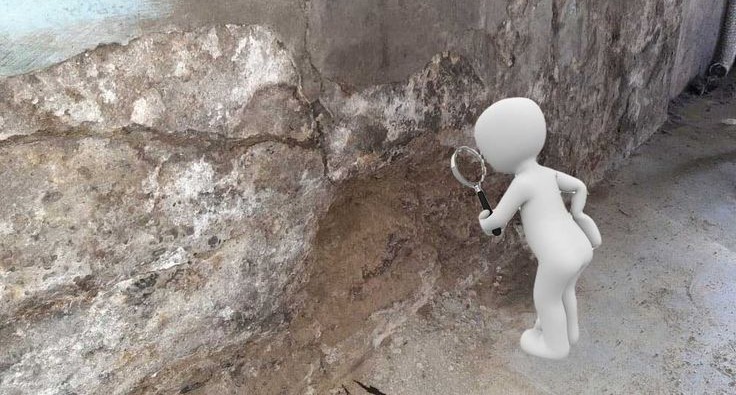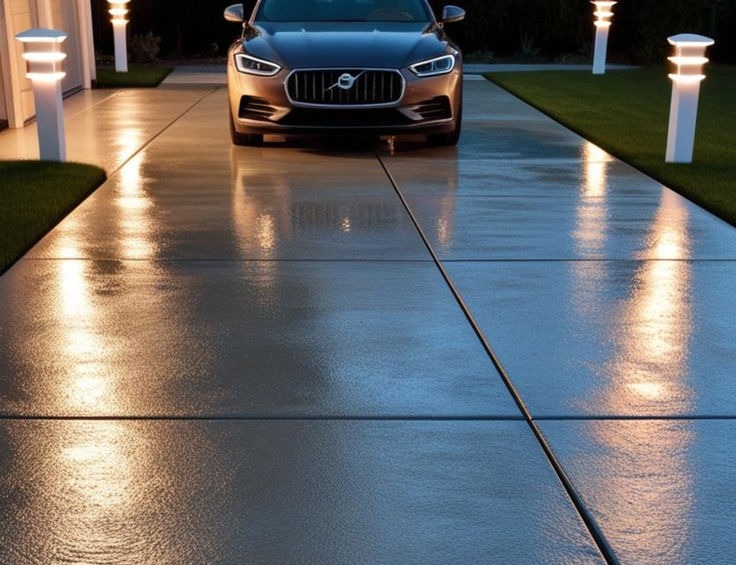If you’re planning a driveway upgrade or building a new home, you’ve likely asked yourself: “Is a concrete driveway worth it?” It’s a fair question, especially when there are several materials to choose from, including asphalt, gravel, pavers, and stamped surfaces. Concrete may cost more upfront, but what does it offer in the long run?
In this comprehensive guide, we’ll break down everything you need to know about the value of a concrete driveway: costs, durability, benefits, comparisons with other materials, and long-term ROI. By the end, you’ll have a clear picture of whether a concrete driveway is the right investment for your home.
What is a Concrete Driveway?

Source: Concrete vs. Asphalt Driveways: What’s Better for Austin Homes?
A concrete driveway is a hard surface made from a mixture of cement, aggregate (like gravel or sand), and water that cures into a durable slab. It’s one of the most common driveway types in residential properties across the U.S. due to its strength and long lifespan.
Initial Cost: Is Concrete More Expensive?
Yes, concrete driveway installation typically cost more upfront than asphalt or gravel. In 2025, the average cost of installing a concrete driveway ranges from $8 to $15 per square foot depending on:
- Thickness of the slab
- Reinforcement (like rebar or wire mesh)
- Decorative options (color, stamping, exposed aggregate)
- Site preparation and grading
- Regional labor costs
A standard two-car concrete driveway (approx. 600 sq. ft) may cost between $4,800 and $9,000 or more.
Why the higher price? Concrete driveways are built to last. You’re paying for a material that delivers durability, aesthetics, and long-term savings.
Also Read: How Much Does a Concrete Driveway Cost in Austin?
Durability and Lifespan: How Long Does a Concrete Driveway Last?
One of the biggest advantages of concrete is its longevity. With proper installation and maintenance, a concrete driveway can last 30 to 40 years — or even longer.
Compare this to:
- Asphalt: 15–25 years
- Gravel: 5–10 years (with regular topping)
- Pavers: 25–30 years (but may require joint repairs)
Concrete stands up well to daily use, weather fluctuations, and vehicle weight. It’s also resistant to rutting, potholes, and erosion.
Read More: How Long Do Concrete Driveways Last in Texas?
Maintenance: Is a Concrete Driveway High Maintenance?
No, concrete driveways are low-maintenance. While not maintenance-free, the upkeep is minimal:
- Sealing every 2–5 years (to protect from moisture and stains)
- Cleaning with a hose or pressure washer
- Repairing small cracks early to prevent spread
Compared to asphalt (which needs frequent sealing and patching) or gravel (which requires periodic topping and raking), concrete is relatively hassle-free.
Read Also: Common Concrete Driveway Problems and How to Fix Them
Aesthetics: Can a Concrete Driveway Look Good?
Absolutely. Today’s concrete driveways can be customized to fit any home style.
Options include:
- Stamped concrete (mimics pavers, stone, brick)
- Colored concrete (with integral color or staining)
- Exposed aggregate (for a textured finish)
- Brushed finishes (for subtle texture and slip-resistance)
Whether you want a minimalist modern look or a rustic stone aesthetic, concrete can be tailored to match your vision.
ROI and Home Value: Will a Concrete Driveway Add Value?
Yes — a concrete driveway can improve your home’s curb appeal and resale value.
Real estate experts often cite driveway quality as a key exterior feature that buyers notice. A cracked, bumpy, or unsightly driveway can drag down your property’s first impression, while a clean, well-installed concrete drive adds:
- Visual appeal
- Ease of use
- Perceived quality
On average, homeowners can recoup 50%–75% of the cost of a concrete driveway in increased property value — more if it improves overall functionality or helps sell the home faster.
Comparing Concrete to Other Driveway Materials
| Feature | Concrete | Asphalt | Gravel | Pavers |
|---|---|---|---|---|
| Lifespan | 30–40 years | 15–25 years | 5–10 years | 25–30 years |
| Maintenance | Low | Medium | High | Medium |
| Cost (per sq. ft.) | $8–$15 | $5–$10 | $1–$3 | $10–$25 |
| Aesthetic Options | High | Low | Low | Very High |
| Weather Resistance | Excellent | Moderate | Poor | Excellent |
| Customization | Medium–High | Low | Low | High |
Concrete is often the best all-around option if you’re looking for a balance of longevity, looks, and low upkeep.
Is a Concrete Driveway Right for Every Climate?

Concrete performs well in a wide range of climates — especially warm or temperate regions. However, in areas with extreme freeze-thaw cycles, extra care is needed:
- Use air-entrained concrete for flexibility
- Ensure proper slope and drainage
- Seal regularly to prevent water intrusion
In hot climates like Texas, concrete holds up particularly well, resisting heat better than asphalt (which softens in high temps).
Environmental Impact: Is Concrete Eco-Friendly?
Concrete has pros and cons from a sustainability perspective.
Pros:
- Long lifespan means less material waste
- Reflective surface reduces urban heat islands
- Doesn’t leach oils into groundwater (like asphalt)
Cons:
- Cement production is energy-intensive
- Concrete is not biodegradable
To improve eco-friendliness, many contractors offer options like recycled aggregate or permeable concrete that allows water drainage.
The Hidden Costs of Cheap Driveways
It’s tempting to go with the cheapest option — but what’s cheap now could cost more later.
Gravel may save you thousands upfront, but:
- It tracks dirt into your home
- Needs regular replenishment
- Reduces curb appeal
Asphalt is budget-friendly but:
- Cracks easier in heat
- Fades faster
- Requires resealing every few years
Concrete may cost more initially, but over decades, it often proves the more economical and attractive choice.
Also Read: Is a Concrete Driveway Worth It?
When to Choose Concrete — And When Not To
Choose concrete if:
- You plan to stay in your home long-term
- You want a driveway that lasts 30+ years
- Curb appeal matters for resale
- You prefer low-maintenance living
Avoid concrete if:
- You’re flipping a home and want a cheap solution
- Your region experiences extreme freeze-thaw cycles and you’re unwilling to maintain it
- You prefer a natural or rustic look that gravel or pavers offer
Is a Concrete Driveway Right for Your Career & Lifestyle?

It might sound odd, but yes, your career and lifestyle can influence whether a concrete driveway is the right choice. For example:
-
Frequent travelers: Low-maintenance concrete is ideal when you’re away often.
-
Home-based businesses (like salons or workshops): Concrete’s durability handles extra foot traffic and parking.
-
Outdoor hobbies (RVs, boats, trailers): Concrete pads can be reinforced for heavier vehicles.
-
Real estate investors/flippers: Depending on the neighborhood, concrete’s curb appeal could help maximize resale price.
Think about how you use your space daily — concrete can flex to fit your life.
Best Concrete Driveway Designs by House Type
Not every home suits the same driveway look! Here’s a quick guide:
| House Style | Recommended Driveway Style |
|---|---|
| Modern/Contemporary | Smooth, minimalist finish or geometric scoring |
| Craftsman/Bungalow | Stamped patterns like cobblestone or brick |
| Ranch | Exposed aggregate for a rustic, textured feel |
| Colonial/Traditional | Clean broom finish with subtle borders |
| Luxury/Custom Homes | Colored concrete, inlays, or custom patterns |
Comparing Driveways Across Austin, Lakeway, Cedar Park, Round Rock & Georgetown
Here’s a handy table comparing key factors across popular Central Texas cities:
| City | Soil Type | Climate Concerns | Style Trends | Permitting Needs |
|---|---|---|---|---|
| Austin | Mixed clay/limestone | Heat + occasional floods | Modern, eco-friendly, stamped | City permits often required |
| Lakeway | Rocky hills | Drainage, slope issues | Custom luxury finishes, natural stone looks | HOA approvals common |
| Cedar Park | Clay-heavy | Soil shifting, heat | Functional + decorative borders | Standard city permits |
| Round Rock | Caliche + clay | Cracking, drainage | Family-friendly, durable surfaces | City + possible neighborhood rules |
| Georgetown | Limestone bedrock | Slope, limestone cuts | Historic charm meets modern textures | City permits, sometimes historic overlays |
Each area has unique challenges, so hire a contractor familiar with local conditions.
Future-Proofing Your Driveway Investment

Want to make sure your new driveway serves you for decades? Consider these add-ons:
-
Reinforced slabs for heavy vehicles or RVs
-
Heated driveway systems (rare in Texas but possible!)
-
Permeable concrete for eco-friendly drainage
-
Integrated lighting for safety and style
-
Smart driveway monitors (emerging tech for smart homes)
These upgrades can increase both functionality and resale value.
Financing Your Concrete Driveway Project

Don’t let cost hold you back — there are several ways to finance your upgrade:
-
Home equity loans/lines of credit (HELOC): Best for large projects, often lower interest.
-
Personal loans: Quick approval, good for mid-size projects.
-
Credit cards: Use cautiously; can work if you’re leveraging a 0% intro offer.
-
Contractor payment plans: Some companies offer staged payments or financing options.
Pro tip: Always weigh the total repayment cost and explore multiple options before committing.
Budgeting for a Concrete Driveway: What Should You Plan For?
Installing or replacing a driveway is a significant financial commitment. Beyond the base installation cost, homeowners should factor in:
-
Permitting fees (if required in your area)
-
Site preparation or demolition of old surfaces
-
Custom finishes like stamping or staining
-
Long-term maintenance costs (like sealing)
-
Potential drainage improvements to prevent future water issues
Pro tip: Always get at least 2–3 quotes from local contractors and ask for detailed breakdowns to avoid surprise expenses.
Tips for Getting the Best Results

If you’ve decided that concrete is worth it, make sure you get the most from your investment:
- Hire experienced concrete contractors with good reviews
- Ask for reinforcement and proper base compaction
- Choose a sealant appropriate for your climate
- Consider decorative finishes for added value
- Schedule installation during dry, mild weather
Final Verdict: Is a Concrete Driveway Worth It?
Yes — for most homeowners, a concrete driveway is absolutely worth it.
Its longevity, aesthetic versatility, and low maintenance make it a strong investment. While the upfront cost is higher than asphalt or gravel, the long-term savings and enhanced curb appeal can more than make up for it.
So, if you’re building a forever home or want a solid return on exterior improvements, concrete is a smart, stylish, and enduring choice.
Still not sure if a concrete driveway is right for you? Schedule a free consultation with a local concrete expert who can assess your site, explain options, and provide a personalized quote.
Want to Learn More?
- [Concrete Driveway Installation Services]
- [Concrete Driveway Replacement in Austin]
- [Common Driveway Problems and How to Fix Them]
FAQ: Is a Concrete Driveway Worth It?
Q: How much does a concrete driveway increase home value?
A well-installed concrete driveway can increase home value by 5%–10%, depending on neighborhood and curb appeal impact.
Q: Is stamped concrete more expensive?
Yes. Expect to pay 20–50% more for decorative finishes, but the visual effect can significantly boost aesthetics and resale value.
Q: Can I install a concrete driveway myself?
DIY installation is not recommended unless you have concrete experience. Improper mixing, leveling, or curing can result in premature cracking.
Q: How long does a concrete driveway take to cure?
You can walk on it after 24–48 hours, drive on it after 7 days, but full curing takes about 28 days.
Q: Can concrete be repaired if damaged?
Yes. Minor cracks can be filled, and resurfacing is possible if the base is stable.
Your Driveway, Done Right.
Ready for a concrete driveway that lasts decades and enhances your home? Contact us today for a custom quote and expert installation.










